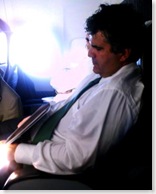Buchalost
October 17, 2007
I began the morning in Bucharest today by going for a run and getting terribly and completely lost. I mean 45 minutes of "Do you 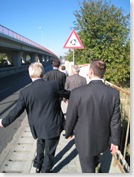 speak English -- do you know where the Howard Johnson's Hotel is?" lost. The team ended the day having to cross a highway and walk along the side of the road a ways to get to our car. But in between these two we had a fabulous day, learning a lot about some of the progressive steps Romania is taking to apply ICT in a sensible way to improve education in their country. And as you can see, the weather was way nicer than Moscow.
speak English -- do you know where the Howard Johnson's Hotel is?" lost. The team ended the day having to cross a highway and walk along the side of the road a ways to get to our car. But in between these two we had a fabulous day, learning a lot about some of the progressive steps Romania is taking to apply ICT in a sensible way to improve education in their country. And as you can see, the weather was way nicer than Moscow.
We started the day (post lost run) in the Microsoft office where we met with people from Romania's Ministry of Education. Included in the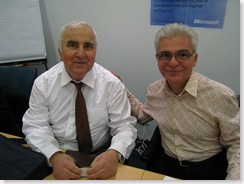 meeting was Professor Adrian Petrescu, who is considered sort of the godfather of technical education in his country. Here is a photo of Dr. Petrescu along with Silviu Hotaran, Microsoft's country manager for Romania. Silviu (on the right) was a student of Dr. Petrescu's in the university.
meeting was Professor Adrian Petrescu, who is considered sort of the godfather of technical education in his country. Here is a photo of Dr. Petrescu along with Silviu Hotaran, Microsoft's country manager for Romania. Silviu (on the right) was a student of Dr. Petrescu's in the university.
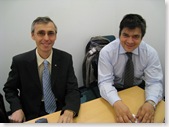 Also attending from the Romanian government was Catalin Grosu and Decebal Popescu. (Yes indeed, there is a person in Romania who looks just like Jack White from the band the White Stripes and is named "Decebal".) Decebal seemed very smart and was passionate about IT curricula. Among other things, he asked about our plans for porting Windows to the OLPC XO device. Will Poole gave a good answer, the shorthand version is "Because the device is exotic and requires so many custom drivers, it's hard. But we are trying."
Also attending from the Romanian government was Catalin Grosu and Decebal Popescu. (Yes indeed, there is a person in Romania who looks just like Jack White from the band the White Stripes and is named "Decebal".) Decebal seemed very smart and was passionate about IT curricula. Among other things, he asked about our plans for porting Windows to the OLPC XO device. Will Poole gave a good answer, the shorthand version is "Because the device is exotic and requires so many custom drivers, it's hard. But we are trying."
Before the 1989 revolution here, Dr. Petrescu designed and deployed across the country a microprocessor based system that used a TV set for display, a cassette recorder for storage, and was based on the Sinclair. Needless to say, he has a lot of experience with national PC programs. He also says he is inspired both by BillG's book "Business at the Speed of Thought" and Nicholas Negroponte's evangelism efforts around 1-to-1 computing, namely, that the best educational technology model for a country involves students with their own PCs with roaming access to the Internet. But he also clearly believes that there is no single optimal technology solution to this problem -- this is a theme I am hearing every time I go on the road now -- in this case because kids from wealthier families want machines with more capabilities than the Asus or the OLPC XO, but this class of machine might be ideal for rural students from lower income families. Early results from one of the pilots in Romania indicate that kids get quickly bored if there is limited software on one of these low end laptops.
Apparently Romania's Prime Minister grew up using one of the Sinclair-like machines, has a technical background, and did a side-buy-side demo of the OLPC XO and the Intel ClassMate PC to members of parliament, explaining how each of the machines worked. That would have been fun to watch. Also, Decebal was quite enthusiastic about the Imagine Cup (Romania won it last year!) and was effusive in his praise for the support they received from the local Microsoft team. Finally, we walked them through a slide deck describing our education strategy, and they expressed interest in learning more about Multipoint and about Microsoft's infrastructure optimization model for education. We will definitely follow up.
From there we went to visit Siveco, one of the largest software ISVs in Romania. We met with Florian Ciolacu, Florin Ilia, and a partner account manager (Flora?) who all spent an hour walking us some of the 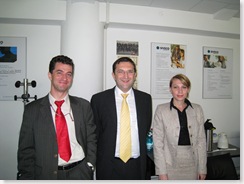 impressive work their company has done in education. Their product is called AeL, a suite of interactive K-12 learning content consisting of 1,800 interactive modules (called "objects") built on the Microsoft stack. They even referred to it as DHTML, not AJAX. You can find samples of their work on the Innovative Teachers Network, including this self-paced chemistry class. (Apologies, it's in Romanian). Florin says that about half of their classes are translated to English, and about 300 to Russian.
impressive work their company has done in education. Their product is called AeL, a suite of interactive K-12 learning content consisting of 1,800 interactive modules (called "objects") built on the Microsoft stack. They even referred to it as DHTML, not AJAX. You can find samples of their work on the Innovative Teachers Network, including this self-paced chemistry class. (Apologies, it's in Romanian). Florin says that about half of their classes are translated to English, and about 300 to Russian.
As far as we can tell, Siveco is one of the few technology partners who have successfully implemented a national education program. Over the last 6 years, in partnership with the Romanian Ministry of Education, they have deployed to Romanian schools 76,000 Windows/Office desktop systems and 1,500 servers; their software was used as the basis for training 80,000 teachers and 3 million students. The company is expanding to the CIS countries, Cypress, and the Middle East. They gave me a copy of AeL and I plan to start demoing it on my travels.
After Siveco, we went to visit RTC, a conglomerate of 70 companies that is partnering with us on a family education PC project in 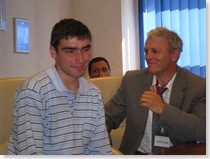 Romania called PC@casa. This is an incubation where we partner with an OEM, retailers, and software partners to package up a low cost PC loaded with education software. We met with RTC's leadership team and did a fun interview with a family that purchased one of these systems (the dad Nicolae and his son Alexandru are shown here, mom Camelia was at work). We'll be showing a video we took of this family at our press event in Budapest tomorrow. I will try to get my hands on a copy and post it.
Romania called PC@casa. This is an incubation where we partner with an OEM, retailers, and software partners to package up a low cost PC loaded with education software. We met with RTC's leadership team and did a fun interview with a family that purchased one of these systems (the dad Nicolae and his son Alexandru are shown here, mom Camelia was at work). We'll be showing a video we took of this family at our press event in Budapest tomorrow. I will try to get my hands on a copy and post it.
Finally, we had a late lunch with Varujan Pambuccian from the Romanian Parliament. The guy is awesome. He has been an elected member of parliament for 12 years and is the chairman of their IC&T Commission, and he used to design 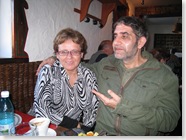 computer systems at the country's Technical Institute (including compilers, and is show here with his fellow former compiler designer Paula Apreutesei, Microsoft's citizenship lead for Romania). We all had a great back an forth discussion, ranging from voucher models for the national "Euro200" PC program to motherboard design to the future of networking in countries in Romania. I loved the fact that a guy who is still hands-on technical (he is working on some patents for TCP/IP extensions) is engaged as an elected official in setting ICT policy for his country.
computer systems at the country's Technical Institute (including compilers, and is show here with his fellow former compiler designer Paula Apreutesei, Microsoft's citizenship lead for Romania). We all had a great back an forth discussion, ranging from voucher models for the national "Euro200" PC program to motherboard design to the future of networking in countries in Romania. I loved the fact that a guy who is still hands-on technical (he is working on some patents for TCP/IP extensions) is engaged as an elected official in setting ICT policy for his country.
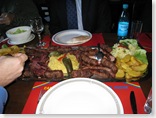 The meal was in a "classic" local restaurant called Casa Romaneasca where they served us a wonderful platter of meat, family style, which in turn resulted in "meat comas" hitting us on the plane to Budapest 90 minutes later. (Last photo courtesy of Will Poole).
The meal was in a "classic" local restaurant called Casa Romaneasca where they served us a wonderful platter of meat, family style, which in turn resulted in "meat comas" hitting us on the plane to Budapest 90 minutes later. (Last photo courtesy of Will Poole).
More tomorrow from our launch event...
